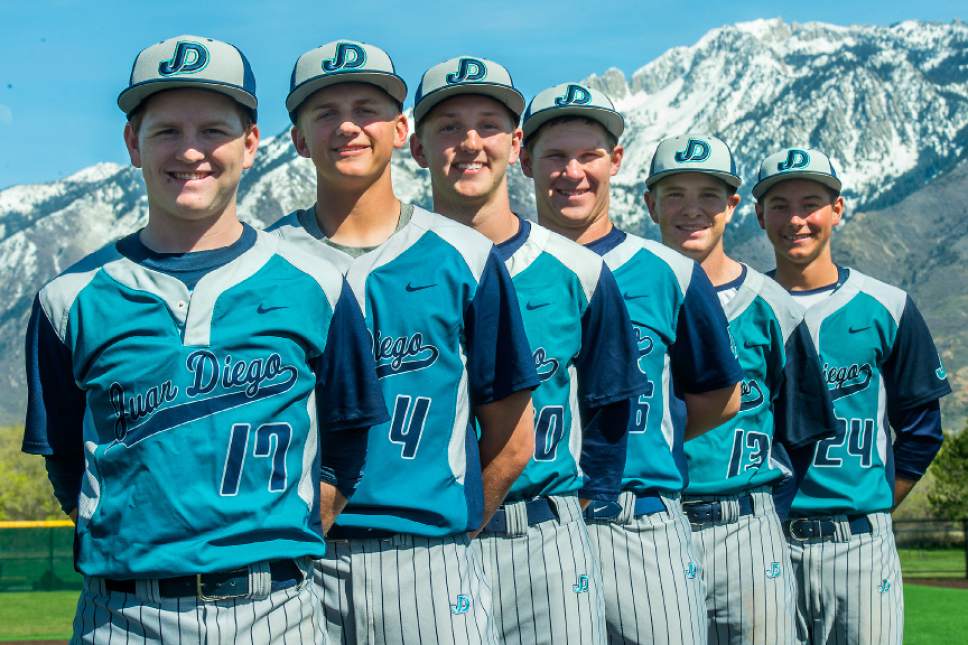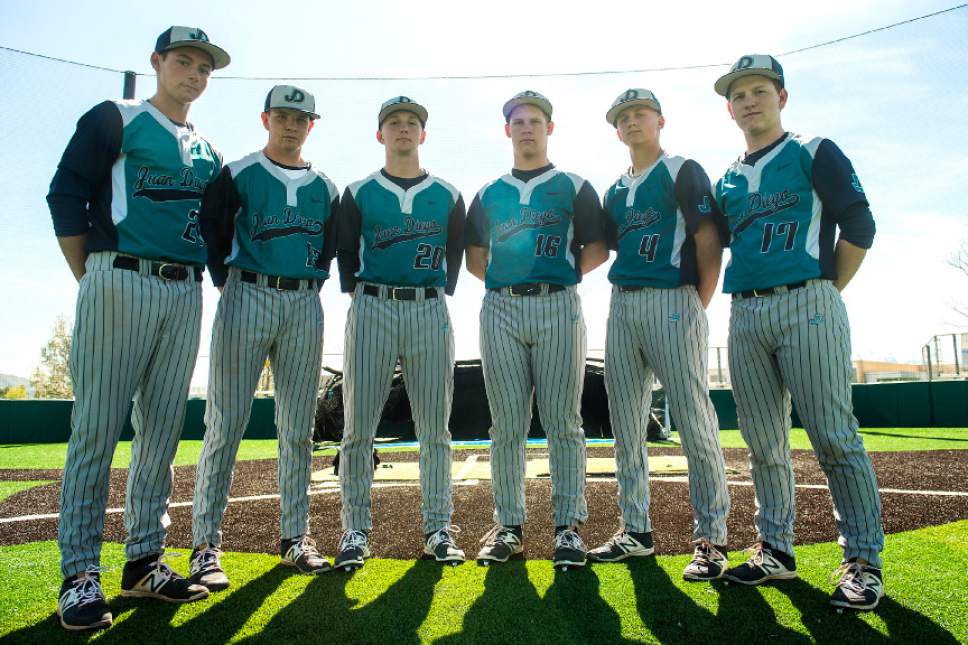This is an archived article that was published on sltrib.com in 2017, and information in the article may be outdated. It is provided only for personal research purposes and may not be reprinted.
Draper • Juan Diego scatters onto the diamond for a routine midweek baseball practice in early April. The weather is sketchy, as is usually the case for Utah during the springtime, but the darkened skies and chilly temperatures haven't dampened the players' attitude.
As the fielding drills commence, the players begin to converse amongst themselves. However, mixed within the camaraderie are subjects not usually associated with high school baseball players.
Like robotics.
You see, the Soaring Eagle baseball program is comprised of talented athletes with high expectations to capture a state championship at season's end.
But deep down, these guys are a bunch of nerds.
"What I like is they're competitive academically with each other, and when we go out to the baseball field, the environments are pretty similar," Juan Diego coach Kellen Carsey said. "It's a topical conversation out on the field: 'What did you score on this test? How did you feel about this question?' It translates to [baseball] as well. Our guys are in the right position a lot of times. They pick up things fast. It's a benefit to us."
There are 33 players listed on the roster at Juan Diego. The cumulative team GPA is 3.55. The average score on the ACT college readiness assessment is 27.65.
There is no denying that Juan Diego shoulders the criticism of competing athletically against smaller-enrollment public schools as a private institution, but Carsey and Juan Diego athletic director Chris Long used the baseball program to illustrate the misconception that athletics are the main priority at the school.
"What we hear all the time is anybody can go to Juan Diego, and the fact is that's not true. If you're not willing to buy into the entire experience, you can't go here," Long said. "We have a way of doing things, and if you're not willing to buy into that, then you can't go here. And that's OK because we're not the answer for everybody."
Students at Juan Diego attend six academic classes per day, and Long said the percentage of those enrolled in advanced-placement classes is "significant." There aren't athletic periods available, which is a disadvantage. And every student and teacher files into the auditorium to read for 35 minutes each day.
"We looked at the rate at which our students were reading independently and said it isn't good enough," Long said.
Senior catcher Colin Helgeson, a 4.0 student, is pursuing a career in mechanical engineering and also is on the robotics team. He juggles his intense curriculum with both after-school hobbies.
"There are times where you have a paper to write, but you also have to go to practice. You are a student-athlete, so you have to do what is necessary to be able to keep up on your work and also make sure you're taking care of your responsibilities with the team," Helgeson said. "If that means staying up until 12 o'clock at night to finish a paper, then you have to do it. You owe that to your team and you also owe that to yourself."
Senior infielder and pitcher Phil Hamel maintains a 3.98 GPA and scored a 32 on the ACT. He's deciding between attending TCU, Rice and Utah to study "something pertaining to business and business analytics or to get my MBA to go into business administration."
He tore his anterior cruciate ligament (ACL) last season, which hampered his ability to draw interest from colleges. But it was a validation of what has been instilled into his lifestyle from an early age, that the hard work in the classroom is something you can take to the bank.
"Baseball is something you'll have for high school and if you're lucky college, but it's always good to have a fallback in academics," Hamel said. "Academics are more of a solid foundation. In my case, getting injured and not being able to pursue that, I have strong academics to fall back on."
Juan Diego is 6-6 this season but has won three straight games, including a two-game sweep against Logan. The losses are somewhat deceptive, as well. Two were against Class 4A powerhouse Spanish Fork. Another was a one-run loss to Class 5A's Mountain Crest. Then its two losses against Desert Hills and Park City — programs that are collectively 22-5 — were by a combined three runs.
The young roster is learning. They're picking up concepts quickly, and that's something Carsey believes is a direct correlation to their success and discipline in the classroom.
"We've got to continue to learn and get better and gain experience because that's the only thing we're really lacking," Carsey said. "We have a lot of talented players. We just got to go through some experiences to gain some more confidence. Each time you experience something for the first time, you learn from it, so the next time it comes up, you can control it better. You can slow it down and take a deep breath and execute. Our kids are smart enough to do that."
Twitter: @trevorphibbs





